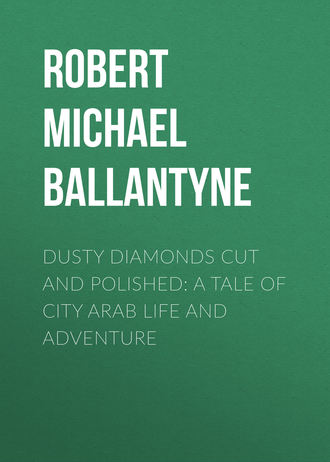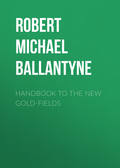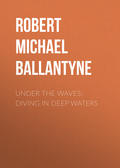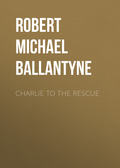
Robert Michael Ballantyne
Dusty Diamonds Cut and Polished: A Tale of City Arab Life and Adventure
The tone in which the last sentence was uttered told more than any words could have conveyed the feelings of the bluff farmer towards the little gem that had been dug out of the London mines and thus given to him.
Reader, they are prolific mines, those East-end mines of London! If you doubt it, go, hear and see for yourself. Perhaps it were better advice to say, go and dig, or help the miners!
Need it be said that our waifs and strays grew and flourished in that rich Canadian soil? It need not! One of the most curious consequences of the new connection was the powerful affection that sprang up between Bobby Frog and Mrs Merryboy, senior. It seemed as if that jovial old lady and our London waif had fallen in love with each other at first sight. Perhaps the fact that the lady was intensely appreciative of fun, and the young gentleman wonderfully full of the same, had something to do with it. Whatever the cause, these two were constantly flirting with each other, and Bob often took the old lady out for little rambles in the wood behind the farm.
There was a particular spot in the woods, near a waterfall, of which this curious couple were particularly fond, and to which they frequently resorted, and there, under the pleasant shade, with the roar of the fall for a symphony, Bob poured out his hopes and fears, reminiscences and prospects into the willing ears of the little old lady, who was so very small that Bob seemed quite a big man by contrast. He had to roar almost as loud as the cataract to make her hear, but he was well rewarded. The old lady, it is true, did not speak much, perhaps because she understood little, but she expressed enough of sympathy, by means of nods, and winks with her brilliant black eyes, and smiles with her toothless mouth, to satisfy any boy of moderate expectations.
And Bobby was satisfied. So, also, were the other waifs and strays, not only with old granny, but with everything in and around their home in the New World.
Chapter Twenty One.
Treats of Altered Circumstances and Blue-Ribbonism
Once again we return to the great city, and to Mrs Frog’s poor lodging.
But it is not poor now, for the woman has at last got riches and joy—such riches as the ungodly care not for, and a joy that they cannot understand.
It is not all riches and joy, however. The Master has told us that we shall have “much tribulation.” What then? Are we worse off than the unbelievers? Do they escape the tribulation? It is easy to prove that the Christian has the advantage of the worldling, for, while both have worries and tribulation without fail, the one has a little joy along with these—nay, much joy if you choose—which, however, will end with life, if not before; while the other has joy unspeakable and full of glory, which will increase with years, and end in absolute felicity!
Let us look at Mrs Frog’s room now, and listen to her as she sits on one side of a cheerful fire, sewing, while Hetty sits on the other side, similarly occupied, and Matty, alias Mita, lies in her crib sound asleep.
It is the same room, the same London atmosphere, which no moral influence will ever purify, and pretty much the same surroundings, for Mrs Frog’s outward circumstances have not altered much in a worldly point of view. The neighbours in the court are not less filthy and violent. One drunken nuisance has left the next room, but another almost as bad has taken his place. Nevertheless, although not altered much, things are decidedly improved in the poor pitiful dwelling. Whereas, in time past, it used to be dirty, now it is clean. The table is the same table, obviously, for you can see the crack across the top caused by Ned’s great fist on that occasion when, failing rather in force of argument while laying down the law, he sought to emphasise his remarks with an effective blow; but a craftsman has been at work on the table, and it is no longer rickety. The chair, too, on which Mrs Frog sits, is the same identical chair which missed the head of Bobby Frog that time he and his father differed in opinion on some trifling matter, and smashed a panel of the door; but the chair has been to see the doctor, and its constitution is stronger now. The other chair, on which Hetty sits, is a distinct innovation. So is baby’s crib. It has replaced the heap of straw which formerly sufficed, and there are two low bedsteads in corners which once were empty.
Besides all this there are numerous articles of varied shape and size glittering on the walls, such as sauce-pans and pot-lids, etcetera, which are made to do ornamental as well as useful duty, being polished to the highest possible degree of brilliancy. Everywhere there is evidence of order and care, showing that the inmates of the room are somehow in better circumstances.
Let it not be supposed that this has been accomplished by charity. Mrs Samuel Twitter is very charitable, undoubtedly. There can be no question as to that; but if she were a hundred times more charitable than she is, and were to give away a hundred thousand times more money than she does give, she could not greatly diminish the vast poverty of London. Mrs Twitter had done what she could in this case, but that was little, in a money point of view, for there were others who had stronger claims upon her than Mrs Frog. But Mrs Twitter had put her little finger under Mrs Frog’s chin when her lips were about to go under water, and so, figuratively, she kept her from drowning. Mrs Twitter had put out a hand when Mrs Frog tripped and was about to tumble, and thus kept her from falling. When Mrs Frog, weary of life, was on the point of rushing once again to London Bridge, with a purpose, Mrs Twitter caught the skirt of her ragged robe with a firm but kindly grasp and held her back, thus saving her from destruction; but, best of all, when the poor woman, under the influence of the Spirit of God, ceased to strive with her Maker and cried out earnestly, “What must I do to be saved?” Mrs Twitter grasped her with both hands and dragged her with tender violence towards the Fold, but not quite into it.
For Mrs Twitter was a wise, unselfish woman, as well as good. At a certain point she ceased to act, and said, “Mrs Frog, go to your own Hetty, and she will tell you what to do.”
And Mrs Frog went, and Hetty, with joyful surprise in her heart, and warm tears of gratitude in her eyes, pointed her to Jesus the Saviour of mankind. It was nothing new to the poor woman to be thus directed. It is nothing new to almost any one in a Christian land to be pointed to Christ; but it is something new to many a one to have the eyes opened to see, and the will influenced to accept. It was so now with this poor, self-willed, and long-tried—or, rather, long-resisting—woman. The Spirit’s time had come, and she was made willing. But now she had to face the difficulties of the new life. Conscience—never killed, and now revived—began to act.
“I must work,” she said, internally, and conscience nodded approval. “I must drink less,” she said, but conscience shook her head. “It will be very hard, you see,” she continued, apologetically, “for a poor woman like me to get through a hard day without just one glass of beer to strengthen me.”
Conscience did all her work by looks alone. She was naturally dumb, but she had a grand majestic countenance with great expressive eyes, and at the mention of one glass of beer she frowned so that poor Mrs Frog almost trembled.
At this point Hetty stepped into the conversation. All unaware of what had been going on in her mother’s mind, she said, suddenly, “Mother, I’m going to a meeting to-night; will you come?”
Mrs Frog was quite willing. In fact she had fairly given in and become biddable like a little child,—though, after all, that interesting creature does not always, or necessarily, convey the most perfect idea of obedience!
It was a rough meeting, composed of rude elements, in a large but ungilded hall in Whitechapel. The people were listening intently to a powerful speaker.
The theme was strong drink. There were opponents and sympathisers there. “It is the greatest curse, I think, in London,” said the speaker, as Hetty and her mother entered.
“Bah!” exclaimed a powerful man beside whom they chanced to sit down. “I’ve drank a lot on’t an’ don’t find it no curse, at all.”
“Silence,” cried some in the audience.
“I tell ’ee it’s all barn wot ’e’s talkin’,” said the powerful man.
“Put ’im out,” cried some of the audience. But the powerful man had a powerful look, and a great bristly jaw, and a fierce pair of eyes which had often been blackened, and still bore the hues of the last fight; no one, therefore, attempted to put him out, so he snapped his fingers at the entire meeting, said, “Bah!” again, with a look of contempt, and relapsed into silence, while the speaker, heedless of the slight interruption, went on.
“Why, it’s a Blue Ribbon meeting, Hetty,” whispered Mrs Frog.
“Yes, mother,” whispered Hetty in reply, “that’s one of its names, but its real title, I heard one gentleman say, is the Gospel-Temperance Association, you see, they’re very anxious to put the gospel first and temperance second; temperance bein’ only one of the fruits of the gospel of Jesus.”
The speaker went on in eloquent strains pleading the great cause—now drawing out the sympathies of his hearers, then appealing to their reason; sometimes relating incidents of deepest pathos, at other times convulsing the audience with touches of the broadest humour, insomuch that the man who said “bah!” modified his objections to “pooh!” and ere long came to that turning-point where silence is consent. In this condition he remained until reference was made by the speaker to a man—not such a bad fellow too, when sober—who, under the influence of drink, had thrown his big shoe at his wife’s head and cut it so badly that she was even then—while he was addressing them—lying in hospital hovering between life and death.
“That’s me!” cried the powerful man, jumping up in a state of great excitement mingled with indignation, while he towered head and shoulders above the audience, “though how you come for to ’ear on’t beats me holler. An’ it shows ’ow lies git about, for she’s not gone to the hospital, an’ it wasn’t shoes at all, but boots I flung at ’er, an’ they only just grazed ’er, thank goodness, an’ sent the cat flyin’ through the winder. So—”
A burst of laughter with mingled applause and cheers cut off the end of the sentence and caused the powerful man to sit down in much confusion, quite puzzled what to think of it all.
“My friend,” said the speaker, when order had been restored, “you are mistaken. I did not refer to you at all, never having seen or heard of you before, but there are too many men like you—men who would be good men and true if they would only come to the Saviour, who would soon convince them that it is wise to give up the drink and put on the blue ribbon. Let it not be supposed, my friends, that I say it is the duty of every one to put on the blue ribbon and become a total abstainer. There are circumstances in which a ‘little wine’ may be advisable. Why, the apostle Paul himself, when Timothy’s stomach got into a chronic state of disease which subjected him, apparently, to ‘frequent infirmities,’ advised him to take a ‘little wine,’ but he didn’t advise him to take many quarts of beer, or numerous glasses of brandy and water, or oceans of Old Tom, or to get daily fuddled on the poisons which are sold by many publicans under these names. Still less did Paul advise poor dyspeptic Timothy to become his own medical man and prescribe all these medicines to himself, whenever he felt inclined for them. Yes, there are the old and the feeble and the diseased, who may, (observe I don’t say who do, for I am not a doctor, but who may), require stimulants under medical advice. To these we do not speak, and to these we would not grudge the small alleviation to their sad case which may be found in stimulants; but to the young and strong and healthy we are surely entitled to say, to plead, and to entreat—put on the blue ribbon if you see your way to it. And by the young we mean not only all boys and girls, but all men and women in the prime of life, ay, and beyond the prime, if in good health. Surely you will all admit that the young require no stimulants. Are they not superabounding in energy? Do they not require the very opposite—sedatives, and do they not find these in constant and violent muscular exercise?”
With many similar and other arguments did the speaker seek to influence the mass of human beings before him, taking advantage of every idea that cropped up and every incident in the meeting that occurred to enforce his advice—namely, total abstinence for the young and the healthy—until he had stirred them up to a state of considerable enthusiasm. Then he said:—
“I am glad to see you enthusiastic. Nothing great can be done without enthusiasm. You may potter along the even tenor of your way without it, but you’ll never come to much good, and you’ll never accomplish great things, without it. What is enthusiasm? Is it not seeing the length, breadth, height, depth, and bearing of a good thing, and being zealously affected in helping to bring it about? There are many kinds of enthusiasts, though but one quality of enthusiasm. Weak people show their enthusiasm too much on the surface. Powerful folk keep it too deep in their hearts to be seen at all. What then, are we to scout it in the impulsive because too obvious; to undervalue it in the reticent because almost invisible? Nay, let us be thankful for it in any form, for the thing is good, though the individual’s manner of displaying it may be faulty. Let us hope that the too gushing may learn to clap on the breaks a little—a very little; but far more let us pray that the reticent and the self-possessed, and the oh!—dear—no—you’ll—never—catch—me—doing—that—sort—of—thing people, may be enabled to get up more steam. Better far in my estimation the wild enthusiast than the self-possessed and self-sufficient cynic. Just look at your gentlemanly cynic; good-natured very likely, for he’s mightily pleased with himself and excessively wise in regard to all things sublunary. Why, even he has enthusiasm, though not always in a good cause. Follow him to the races. Watch him while he sees the sleek and beautiful creatures straining every muscle, and his own favourite drawing ahead, inch by inch, until it bids fair to win. Is that our cynic, bending forward on his steed, with gleaming eyes and glowing cheek, and partly open mouth and quick-coming breath, and so forgetful of himself that he swings off his hat and gives vent to a lusty cheer as the favourite passes the winning-post?
“But follow him still further. Don’t let him go. Hold on to his horse’s tail till we see him safe into his club, and wait there till he has dined and gone to the opera. There he sits, immaculate in dress and bearing, in the stalls. It is a huge audience. A great star is to appear. The star comes on—music such as might cause the very angels to bend and listen.
“The sweet singer exerts herself; her rich voice swells in volume and sweeps round the hall, filling every ear and thrilling every heart, until, unable to restrain themselves, the vast concourse rises en masse, and, with waving scarf and kerchief, thunders forth applause! And what of our cynic? There he is, the wildest of the wild—for he happens to love music—shouting like a maniac and waving his hat, regardless of the fact that he has broken the brim, and that the old gentleman whose corns he has trodden on frowns at him with savage indignation.
“Yes,” continued the speaker, “the whole world is enthusiastic when the key-note of each individual, or class of individuals, is struck; and shall we be ashamed of our enthusiasm for this little bit of heavenly blue, which symbolises the great fact that those who wear it are racing with the demon Drink to save men and women, (ourselves included, perhaps), from his clutches; racing with Despair to place Hope before the eyes of those who are blindly rushing to destruction; racing with Time to snatch the young out of the way of the Destroyer before he lays hand on them; and singing—ay, shouting—songs of triumph and glory to God because of the tens of thousands of souls and bodies already saved; because of the bright prospect of the tens of thousands more to follow; because of the innumerable voices added to the celestial choir, and the glad assurance that the hymns of praise thus begun shall not die out with our feeble frames, but will grow stronger in sweetness as they diminish in volume, until, the river crossed, they shall burst forth again with indescribable intensity in the New Song.
“Some people tell us that these things are not true. Others say they won’t last. My friends, I know, and many of you know, that they are true, and even if they were not to last, have we not even now ground for praise? Shall we not rejoice that the lifeboat has saved some, because others have refused to embark and perished? But we don’t admit that these things won’t last. Very likely, in the apostolic days, some of the unbelievers said of them and their creed, ‘How long will it last?’ If these objectors be now able to take note of the world’s doings, they have their answer from Father Time himself; for does he not say, ‘Christianity has lasted nearly nineteen hundred years, and is the strongest moral motive-power in the world to-day?’ The Blue Ribbon, my friends, or what it represents, is founded on Christianity; therefore the principles which it represents are sure to stand. Who will come now and put it on?”
“I will!” shouted a strong voice from among the audience, and up rose the powerful man who began the evening with “bah!” and “pooh!” He soon made his way to the platform amid uproarious cheering, and donned the blue.
“Hetty,” whispered Mrs Frog in a low, timid voice, “I think I would like to put it on too.”
If the voice had been much lower and more timid, Hetty would have heard it, for she sat there watching for her mother as one might watch for a parent in the crisis of a dread disease. She knew that no power on earth can change the will, and she had waited and prayed till the arrow was sent home by the hand of God.
“Come along, mother,” she said—but said no more, for her heart was too full.
Mrs Frog was led to the platform, to which multitudes of men, women, and children were pressing, and the little badge was pinned to her breast.
Thus did that poor woman begin her Christian course with the fruit of self-denial.
She then set about the work of putting her house in order. It was up-hill work at first, and very hard, but the promise did not fail her, “Lo! I am with you alway.” In all her walk she found Hetty a guardian angel.
“I must work, Hetty, dear,” she said, “for it will never do to make you support us all; but what am I to do with baby? There is no one to take charge of her when I go out.”
“I am quite able to keep the whole of us, mother, seeing that I get such good pay from the lady I work for, but as you want to work, I can easily manage for baby. You know I’ve often wished to speak of the Infant Nursery in George Yard. Before you sent Matty away I wanted you to send her there, but—” Hetty paused.
“Go on, dear. I was mad agin’ you an’ your religious ways; wasn’t that it?” said Mrs Frog.
“Well, mother, it don’t matter now, thank God. The Infant Nursery, you know, is a part of the Institution there. The hearts of the people who manage it were touched by the death of so many thousands of little ones every year in London through want and neglect, so they set up this nursery to enable poor widowed mothers and others to send their babies to be cared for—nursed, fed, and amused in nice airy rooms—while the mothers are at work. They charge only fourpence a day for this, and each baby has its own bag of clothing, brush and comb, towel and cot. They will keep Matty from half-past seven in the morning till eight at night for you, so that will give you plenty of time to work, won’t it, mother?”
“It will indeed, Hetty, and all for fourpence a day, say you?”
“Yes, the ordinary charge is fourpence, but widows get it for twopence for each child, and, perhaps, they may regard a deserted wife as a widow! There is a fine of twopence per hour for any child not taken away after eight, so you’ll have to be up to time, mother.”
Mrs Frog acted on this advice, and thus was enabled to earn a sufficiency to enable her to pay her daily rent, to clothe and feed herself and child, to give a little to the various missions undertaken by the Institutions near her, to put a little now and then into the farthing bank, and even to give a little in charity to the poor!
Now, reader, you may have forgotten it, but if you turn back to near the beginning of this chapter, you will perceive that all we have been writing about is a huge digression, for which we refuse to make the usual apology.
We return again to Mrs Frog where we left her, sitting beside her cheerful fire, sewing and conversing with Hetty.
“I can’t bear to think of ’im, Hetty,” said Mrs Frog. “You an’ me sittin’ here so comfortable, with as much to eat as we want, an’ to spare, while your poor father is in a cold cell. He’s bin pretty bad to me of late, it’s true, wi’ that drink, but he wasn’t always like that, Hetty; even you can remember him before he took to the drink.”
“Yes, mother, I can, and, bless the Lord, he may yet be better than he ever was. When is his time up?”
“This day three weeks. The twelve months will be out then. We must pray for ’im, Hetty.”
“Yes, mother. I am always prayin’ for him. You know that.”
There was a touch of anxiety in the tones and faces of both mother and daughter as they talked of the father, for his home-coming might, perhaps, nay probably would, be attended with serious consequences to the renovated household. They soon changed the subject to one more agreeable.
“Isn’t Bobby’s letter a nice one, mother?” said Hetty, “and so well written, though the spellin’ might have been better; but then he’s had so little schoolin’.”
“It just makes my heart sing,” returned Mrs Frog. “Read it again to me, Hetty. I’ll never tire o’ hearin’ it. I only wish it was longer.”
The poor mother’s wish was not unnatural, for the letter which Bobby had written was not calculated to tax the reader’s patience, and, as Hetty hinted, there was room for improvement, not only in the spelling but in the writing. Nevertheless, it had carried great joy to the mother’s heart. We shall therefore give it verbatim et literatim.
Brankly Farm—Kanada.
“Deer Mutrer. wen i left you i promisd to rite so heer gos. this Plase is eaven upon arth. so pritty an grand. O you never did see the likes. ide park is nuffin to it, an as for Kensintn gardings—wy to kompair thems rediklis. theres sitch a nice little gal here. shes wun of deer mis mukfersons gals—wot the vestenders calls a wafe and sometimes a strai. were all very fond of er spesially tim lumpy. i shuvd im in the river wun dai. my—ow e spluterd. but e was non the wus—all the better, mister an mistress meryboi aint that a joly naim are as good as gold to us. we as prairs nite and mornin an no end o witls an as appy as kings and kueens a-sitin on there throns. give all our luv to deer father, an etty an baiby an mis mukferson an mister olland an all our deer teechers. sai we’ll never forgit wot they told us. your deer sun Bobby.”
“Isn’t it beautiful?” said Mrs Frog, wiping away a tear with the sock she was darning in preparation for her husband’s return.
“Yes, mother. Bless the people that sent ’im out to Canada,” said Hetty, “for he would never have got on here.”
There came a tap to the door as she spoke, and Mrs Twitter, entering, was received with a hearty welcome.
“I came, Mrs Frog,” she said, accepting the chair—for there was even a third chair—which Hetty placed for her, “to ask when your husband will be home again.”
Good Mrs Twitter carefully avoided the risk of hurting the poor woman’s feelings by needless reference to jail.
“I expect him this day three weeks, ma’am,” replied Mrs Frog.
“That will do nicely,” returned Mrs Twitter. “You see, my husband knows a gentleman who takes great pleasure in getting con— in getting men like Ned, you know, into places, and giving them a chance of—of getting on in life, you understand?”
“Yes, ma’am, we must all try to git on in life if we would keep in life,” said Mrs Frog, sadly.
“Well, there is a situation open just now, which the gentleman—the same gentleman who was so kind in helping us after the fire; you see we all need help of one another, Mrs Frog—which the gentleman said he could keep open for a month, but not longer, so, as I happened to be passing your house to-night on my way to the Yard, to the mothers’ meeting, I thought I’d just look in and tell you, and ask you to be sure and send Ned to me the moment he comes home.”
“I will, ma’am, and God bless you for thinkin’ of us so much.”
“Remember, now,” said Mrs Twitter, impressively, “before he has time to meet any of his old comrades. Tell him if he comes straight to me he will hear something that will please him very much. I won’t tell you what. That is my message to him. And now, how is my Mita? Oh! I need not ask. There she lies like a little angel!” (Mrs Twitter rose and went to the crib, but did not disturb the little sleeper.) “I wish I saw roses on her little cheeks and more fat, Mrs Frog.”
Mrs Frog admitted that there was possible improvement in the direction of roses and fat, but feared that the air, (it would have been more correct to have said the smoke and smells), of the court went against roses and fat, somehow. She was thankful, however, to the good Lord for the health they all enjoyed in spite of local disadvantages.
“Ah!” sighed Mrs Twitter, “if we could only transport you all to Canada—”
“Oh! ma’am,” exclaimed Mrs Frog, brightening up suddenly, “we’ve had such a nice letter from our Bobby. Let her see it, Hetty.”
“Yes, and so nicely written, too,” remarked Hetty, with a beaming face, as she handed Bobby’s production to the visitor, “though he doesn’t quite understand yet the need for capital letters.”
“Never mind, Hetty, so long as he sends you capital letters,” returned Mrs Twitter, perpetrating the first pun she had been guilty of since she was a baby; “and, truly, this is a charming letter, though short.”
“Yes, it’s rather short, but it might have been shorter,” said Mrs Frog, indulging in a truism.
Mrs Twitter was already late for the mothers’ meeting, but she felt at once that it would be better to be still later than to disappoint Mrs Frog of a little sympathy in a matter which touched her feelings so deeply. She sat down, therefore, and read the letter over, slowly, commenting on it as she went along in a pleasant sort of way, which impressed the anxious mother with, not quite the belief, but the sensation that Bobby was the most hopeful immigrant which Canada had received since it was discovered.
“Now, mind, send Ned up at once,” said the amiable lady when about to quit the little room.
“Yes, Mrs Twitter, I will; good-night.”







